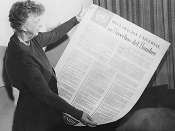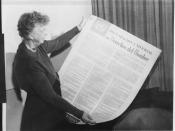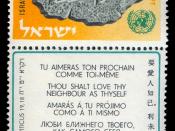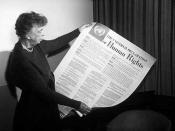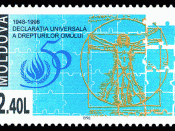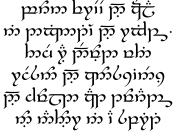In 1916, a poet by the name of Robert Frost released a book of poems entitled, Mountain Interval. In this book was written, "The Road Not Taken", a poem that has been my favorite since I first read it in third grade. When I first read the poem I was captivated by the fact that it was a sort of adventurous poem. The speaker was a traveler and had come to a fork in the road and had chosen to take the least traveled road. To a third grader this was adventurous, but as I continued to grow and make my own decisions, I kept looking to this poem and finding that it was similar to my life. I never took the more popular road. I took the least traveled road and at times I even forged my own. So, throughout my life I have looked at and reevaluated the meaning of this poem and why it means so much to me.
After many years of learning and tripping over my mistakes I now believe that Robert Frost used rhyme and imagery to expand on one of the basic human rights, being free to make our own choices in life.
"The Road Not Taken" was written in a way to suggest that the rhyme scheme is present for order, but does not convey ideas in a linear fashion. I have been able to separate the poem into four sets of five lines each. Within each set is a rhyme scheme of A, B, A, A, B. Of course the rhyme itself changes with each new set. Lets look at the first set: Two roads diverged in a yellow wood, And sorry I could not travel both And be one traveler, long I stood And looked down one as far as I could To where it bent in the undergrowth; (line 1-5) Now in this set we can see the rhyme scheme in action and as I start to but the A's with the A's, and the B's with the B's, we find that the rhyme scheme starts to fall apart. The A's do go together, and it goes something like this Two roads diverged in a yellow wood, And be one traveler, long I stood And looked down one as far as I could These work and sound ok. As I try the B's you see how there is an actual jumble in the scheme.
And sorry I could not travel both To where it bent in the undergrowth; As you see here this makes absolutely no sense. I could go on and show how this goes on, but take my word for it, it is jumbled up. Sometimes it makes sense and other times it does not.
In order to set up my idea that this poem is about the basic human right to freedom of choice, I must explain the poem in my own words. The words of Robert Frost create imagery that has helped me to understand and fall in love with this poem.
Two roads diverged in a yellow wood, This is the actual point of decision that is available for the traveler. It also sets the scene for the whole poem. At this point we know where the roads are, the color of the woods, the approximate time of the year, and how many roads.
And sorry I could not travel both This is the point at which the traveler knows that he cannot travel both roads.
And be one traveler, long I stood And looked down one as far as I could to where it bent in the undergrowth; 5 The traveler is looking down the roads one after the other. The traveler tells us some more scenery, there is some underbrush. So now we know that our forest is full of all types of plants.
Then took the other, as just as fair, And having perhaps the better claim, Because it was grassy and wanted wear; Though as for that the passing there Had worn them really about the same 10 And both that morning equally lay In leaves no step had trodden black.
In this set here we see that the traveler has made their decision to take the least traveled road. It may have slightly larger grass, but is in want of wear. The traveler tells us that the leaves of the trees also lie equally and un-trodden upon the roads. The chosen road has been worn equally as well as the other road, but not in the recent times.
Oh, I kept the first for another day! Yet knowing how way leads on to way, I doubted if I should ever come back. 15 The traveler has decided to save the other road for another day. In other words he has decided that on the day that he might or might not come back, he might take the other road.
I shall be telling this with a sigh Somewhere ages and ages hence: Two roads diverged in a wood, and I - I took the one less traveled by, And that has made all the difference. 20 This last set is about the traveler knowing that in the future he will be telling this story. A story of two roads, and the decision that the traveler had made, and the difference it has made to his life. This is the story of the one moment of freedom to choose which road to take.
Freedom of choice; is it really a freedom? Well according to the United Nations' Universal Declaration of Human Rights, freedom of decision is guaranteed to the nations of the United Nations under Articles 18 & 19. This poem was published around 1916, long before the United Nations signed into being the aforementioned document. So, at this time Robert Frost had known and believed that freedom of choice was an essential human right. The last three lines of the poem as follows: "Two roads diverged in a wood, and I- I took the one less traveled by, And that has made all the difference." (18-20) These three lines are the basis for the reevaluation of my life at every turn I make. Did I make the proper choice? Did I take the road less traveled or did I take the safe and well-traveled path through the woods. Another saying that I grew up hearing from my father was, "You always have freedom of choice, however you never have freedom of consequence." Is this the same as what Robert Frost was trying to get at? The traveler takes the road less traveled, their choice, "And it has made all the difference." (line 20), their consequence. Freedom of choice is a right and it is defendable to most of the world.
Robert Frost did use rhyme and imagery to convey the idea that our basic right to freedom of choice has been present for years. The rhyme of this particular poem, while not overly important, did show that the poem was truly about a randomness of the free thought we all enjoy. Also, the imagery of this poem creates a sense of actually being in the forest with the traveler, staring down both of those roads, making your decision, and starting off on whatever new journeys await us. I found out that freedom of choice is important to me, and I have seen that most of the world agrees. Remember it is usually the road least traveled that leads us to the great discoveries of History.
Bibliography Robert Frost Web Page. www.roberfrost.org Universal Declaration of Human Rights. United Nations. 1948. http://www.un.org/Overview/rights.html
